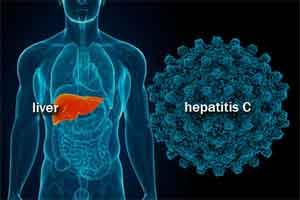- Home
- Editorial
- News
- Practice Guidelines
- Anesthesiology Guidelines
- Cancer Guidelines
- Cardiac Sciences Guidelines
- Critical Care Guidelines
- Dentistry Guidelines
- Dermatology Guidelines
- Diabetes and Endo Guidelines
- Diagnostics Guidelines
- ENT Guidelines
- Featured Practice Guidelines
- Gastroenterology Guidelines
- Geriatrics Guidelines
- Medicine Guidelines
- Nephrology Guidelines
- Neurosciences Guidelines
- Obs and Gynae Guidelines
- Ophthalmology Guidelines
- Orthopaedics Guidelines
- Paediatrics Guidelines
- Psychiatry Guidelines
- Pulmonology Guidelines
- Radiology Guidelines
- Surgery Guidelines
- Urology Guidelines
EASL's 2018 Recommendations on Treatment of Hepatitis C

Hepatitis C virus (HCV) infection is a major cause of chronic liver disease, with approximately 71 million chronically infected individuals worldwide.The European Association for the Study of the Liver (EASL) has released recommendations on treatment of Hepatitis C which have been published in the Journal Of Hepatology.These European associations for the Study of the Liver Recommendations on Treatment of Hepatitis C describe the optimal management of patients with acute and chronic HCV infections in 2018 and onwards.These EASL Recommendations on Treatment of Hepatitis Care intended to assist physicians and other healthcare providers, as well as patients and other interested individuals, in the clinical decision-making process, by describing the current optimal management of patients with acute and chronic HCV infections.The guideline has Aa number of recommendations out of which some salient ones are given below.
Key recommendations:
- All patients with suspected HCV infection should be tested for anti-HCV antibodies in serum or plasma as first-line diagnostic test (A1).
- In the case of suspected acute hepatitis C, in immunocompromised patients and in patients on haemodialysis,HCV RNA testing in serum or plasma should be part of the initial evaluation (A1).
- If anti-HCV antibodies are detected, HCV RNA should be determined by a sensitive molecular method with a lower limit of detection ≤15 IU/ml (A1).
I“All patients with suspected HCV infection should be tested for anti-HCV antibodies in serum or plasma as first-line diagnostic test” - “In the case of suspected acute hepatitis C, in immunocompromised patients and in patients on Haemodialysis, HCV RNA testing in serum or plasma should be part of the initial evaluation”
- Screening for HCV infection should be based on the detection of anti-HCV antibodies in serum or plasma by means of enzyme immunoassay
- If anti-HCV antibodies are detected, the presence of HCV RNA, or alternatively HCV core antigen (if HCV RNA assays are not available and/or not affordable) in serum or plasma should be determined to identify patients with ongoing infection
- The HCV genotype and genotype 1 subtype (1a or 1b) must be assessed prior to treatment initiation to determine the choice of therapy and its duration, among other parameters
- Drug-drug interactions are a key consideration in treating HIV-HCV coinfected patients, and close attention must be paid to anti-HIV drugs that are contraindicated, not recommended or require dose adjustment with particular DAA regimens
- In patients with HCC awaiting liver transplantation with an HCV infection, liver transplantation must be considered as the main therapeutic goal and the antiviral treatment decision must be made on a case-by-case basis through a multidisciplinary discussion
- Patients with HCV infection and mild to moderate renal impairment (eGFR ≥30 ml/min/1.73 m2 ) should be treated according to the general recommendations. No dose adjustments of HCV DAAs are needed, but these patients should be carefully monitored
- After transplantation, solid organ transplant recipients, including kidney, heart, lung, pancreas or small bowel recipients should be treated with the fixed-dose combination of sofosbuvir and ledipasvir (genotypes 1, 4, 5 and 6) or with the fixed-dose combination of sofosbuvir and velpatasvir (all genotypes) according to the general recommendations, without the need for immunosuppressant drug dose adjustments
- Measurement of HCV core antigen levels in serum or plasma by EIA can be used as an alternative to HCV RNA level measurement to monitor treatment efficacy when HCV RNA assays are not available and/or not affordable
- Renal function should be checked monthly in patients with reduced eGFR receiving sofosbuvir
- In patients who need ribavirin (patients with decompensated [Child-Pugh B or C] cirrhosis), the dose of ribavirin should be adjusted downward by 200 mg in decrements if the haemoglobin level drops below 10 g/dl. Ribavirin administration should be stopped if the haemoglobin levels drops below 8.5 g/dl
- Patients with advanced fibrosis (F3) or cirrhosis (F4) with SVR should undergo surveillance for HCC every 6 months by means of ultrasound.
- Patients should be educated on the importance of adherence to therapy, following the dosing recommendations and reporting the use of other prescribed medications, over-the-counter medications, medications bought via the internet, and use of party or recreational drugs (A1).
- HCC surveillance every 6 months must be continued indefinitely in patients with advanced fibrosis (F3) and cirrhosis (A1).
For full guidelines log on to : DOI: https://doi.org/10.1016/j.jhep.2018.03.026

Disclaimer: This site is primarily intended for healthcare professionals. Any content/information on this website does not replace the advice of medical and/or health professionals and should not be construed as medical/diagnostic advice/endorsement or prescription. Use of this site is subject to our terms of use, privacy policy, advertisement policy. © 2020 Minerva Medical Treatment Pvt Ltd